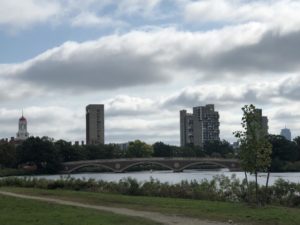
National Science Foundation, Arlington, VA
In March 2010, GRG received its own grant from the NSF, Division of Gender in Science and Engineering to conduct the Massachusetts Linking Experiences and Pathways (M-LEAP) Research Project; it was designed to answer the question: How do students’ in-school and out-of-school experiences shape their choices related to their future careers? M-LEAP was a longitudinal study of over 1,300 students who were followed for three years, starting when they were in 3rd, 4th, 5th, or 6th grade, and who were in 5th, 6th, 7th, or 8th grade at the completion of the study. Aside from student surveys (and interviews with a subsample), we collected survey data from their parents, teachers, district subject matter specialists, and community program representatives. One school in each of 8 districts across Massachusetts participated in the study. These schools were a mix of urban, suburban, and rural in different parts of the state, and the sample provided diversity in terms of socioeconomic status and of race/ethnicity.
M-LEAP 2 was a three and a half-year NSF-funded longitudinal research follow-on study to M-LEAP. It was designed to continue exploring how early science experiences in formal and informal settings are related to gender-based differences in science achievement-related choices in middle and high school. While M-LEAP was mostly quantitative, M-LEAP 2 was heavily qualitative; using in-depth interviews with 72 of the initial students and their families, we started with 6th-9th graders and followed them to grades 9-12. This study allowed us to uncover a deeper understanding of the responses in M-LEAP 1, while broadening the scope of the research.
National Science Foundation, Arlington, VA. and Alfred P. Sloan Foundation, New York, NY
The Women’s Experiences in College Engineering (WECE) Project, funded by the National Science Foundation and the Alfred P. Sloan Foundation, was GRG’s 3 ½-year, longitudinal, cross-institutional, controlled study of the experiences of women undergraduate students in engineering at 53 institutions of higher education across the U.S. The purpose of the research study was to ascertain the influence of support activities on the retention rates of women in engineering majors. The primary data collection tool was a web-based survey with approximately 8,000 female students each year. The annual student surveys were supplemented by an engineering faculty survey, administrator survey, interviews with Women in Engineering Program directors, and site visits.
The seeds for the WECE project were sown when GRG received a planning grant from the Alfred P. Sloan Foundation to conduct a small study of existing Women in Engineering programs. Our goal was to gain a better understanding of these programs, in terms of their objectives and how they are implemented. As part of our study, we found out about college recruitment and retention activities, as well as pre-college motivational activities carried out by these programs at the middle school and high school level. These findings motivated us to write the proposal to carry out an extensive study of women’s experiences in engineering at the undergraduate level.
